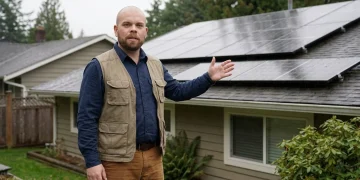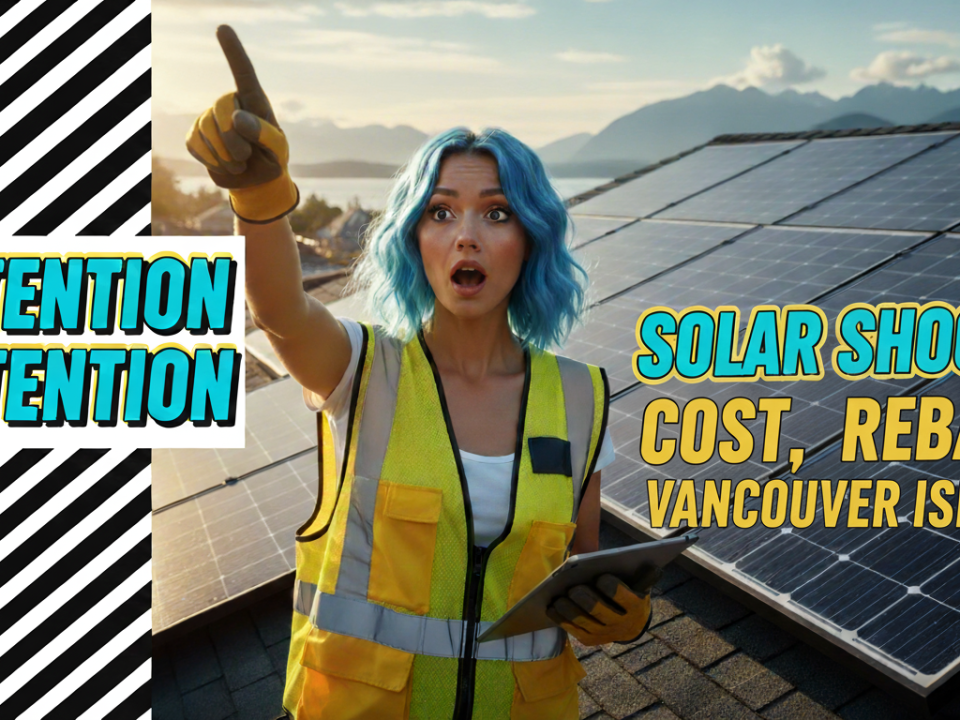
Solar Panels Newfoundland Labrador Guide For 2025
August 5, 2025
Solar Panels Prince Edward Island (PEI) Guide 2025
August 6, 2025The conversation around residential solar in Quebec used to be short. With some of the lowest electricity rates in North America, the math just didn’t work for most people. The time it took to recoup your investment was simply too long.
But things are changing, and for 2025, the change is massive; here is a detailed breakdown of solar updates.
Hydro-Québec has finally stepped up with a real plan to support homeowners. This isn’t a small trial program; it’s a fundamental shift in the province’s energy strategy. For the first time, a major financial incentive is on the table, and it completely alters the calculation for anyone considering solar power. So, let’s break down what this actually means for you, your home, and your wallet. No fluff, just the straight goods.

Why Choose Solar Panels in Quebec?
For a long time, Quebec has run almost entirely on its massive hydro power infrastructure. It’s a legacy of clean energy most places would envy. So, why add solar to the mix? The answer is about diversification and future-proofing. Quebec’s energy needs are growing, especially with the push towards electric vehicles and heating systems like heat pumps. Hydro-Québec knows that relying on dams alone isn’t enough for the future.

What Are the Benefits of Solar Energy?
The benefits of solar power are straightforward. First, you generate your own electricity, which gives you a degree of independence from the grid and rising utility rates. Every kilowatt-hour (kWh) your panels produce is one you don’t have to buy from Hydro-Québec. This leads to a direct reduction in your monthly electricity bill.
Second, it’s a clean, renewable energy source. Installing a solar power system on your roof reduces your household’s carbon footprint. While Quebec’s grid is already clean, producing your own power contributes to a more resilient and decentralized energy system across the province.

How Is Solar Energy Utilized in Quebec?
Historically, solar energy in Quebec was limited to off-grid homes and a few passionate early adopters. The numbers were tiny. But the provincial government and Hydro-Québec have set a new course. Their goal is to add 3,000 megawatts (MW) of solar power to the grid by 2035.
This isn’t just about massive solar farms. A huge part of this plan involves rooftop solar on homes and businesses. The aim is to have the equivalent of 125,000 residential solar customers by 2035. This signals that solar is no longer a niche interest but a key part of Quebec’s energy future.
Understanding the Costs of Solar Panels
The price tag is the first thing everyone asks about. Let’s get right into the numbers. The cost of a solar energy system is not a simple one-size-fits-all figure.
What Factors Affect the Cost of Solar Panels?
Several key components determine the final upfront cost of installing solar panels:
- System Size (kW): This is the biggest factor. The more power you need, the more panels you’ll install, and the higher the cost.
- Solar Panels: The type and efficiency of the panels matter. High-efficiency monocrystalline panels are the standard today and perform best in climates like Quebec’s, but they cost a bit more.
- Inverter: This device converts the DC electricity from your panels into the AC electricity your home uses. You can have a central inverter or microinverters for each panel.
- Installation Labour: This includes the cost of mounting the panels on your rooftop, wiring the system, and connecting it to your home’s electrical panel. A complex roof will increase labour costs.
- Battery Backup: A solar battery is optional but adds significant cost. It allows you to store excess power for use during an outage. Without a battery, your system shuts down when the grid goes down.

How Much Do Solar Panels Cost in 2025?
In Quebec, the average installation cost for a residential solar system in 2025 is around $2.99 per watt before any incentives. This price includes all the hardware, labour, and permits.
To make that number real, here’s a table showing typical system costs for different home sizes.
| System Size | Estimated Upfront Cost (Before Incentives) | Ideal for Homes with Annual Energy Use |
|---|---|---|
| 5 kW | ~$14,950 | 5,000 – 6,000 kWh |
| 8 kW | ~$23,920 | 8,000 – 10,000 kWh |
| 10 kW | ~$29,900 | 10,000 – 12,000 kWh |
| 12 kW | ~$35,880 | 12,000 – 15,000 kWh |
What Is the Average Installation Cost in Quebec?
As shown, a typical residential solar installation will range from $15,000 to over $35,000, depending heavily on the size of the system. This is the gross cost before we apply the new, game-changing incentives.

Financial Incentives and Rebates
This is where the story for solar in Quebec gets exciting. For years, the lack of meaningful solar incentive programs was the biggest barrier. That has now changed.
Are There Any Government Incentives Available?
Yes. Starting in 2025, Hydro-Québec is launching a new financial assistance program for both residential and commercial solar installations. Here are the details:
- Incentive Amount: $1,000 per kilowatt (kW) of solar panels installed.
- Cap: The rebate is capped at a maximum of 40% of the total installation cost.
This is a direct, upfront rebate that slashes the initial investment. The federal Canada Greener Homes Grant is no longer accepting new applicants, so this provincial program is the main incentive for Quebec homeowners.
Let’s apply this rebate to our previous cost examples to see the real price you’d pay.
| System Size | Estimated Upfront Cost | Hydro-Québec Rebate ($1,000/kW) | Estimated Net Cost |
|---|---|---|---|
| 5 kW | $14,950 | $5,000 | $9,950 |
| 8 kW | $23,920 | $8,000 | $15,920 |
| 10 kW | $29,900 | $10,000 | $19,900 |
| 12 kW | $35,880 | $12,000 | $23,880 |
As you can see, the rebate dramatically reduces the system costs, making solar accessible to far more people.

How Can Homeowners Benefit from Tax Credits?
For residential solar, there are currently no federal or provincial tax credits available. The federal Clean Technology Investment Tax Credit offers a 30% refundable credit, but it is aimed at businesses and commercial solar projects, not individual homeowners.
The interest-free loan portion of the Canada Greener Homes Initiative (up to $40,000) is still available for homeowners who are already approved and in the system, but new applications are closed.
What Are the Available Rebates for 2025?
To be clear, the single most important rebate for homeowners in Quebec in 2025 is the Hydro-Québec solar program offering $1,000 per kW installed. This is the program that makes the financial case for going solar in the province.
Net Metering
Net metering is the billing mechanism that allows you to get credit for the excess electricity your solar panels generate. Understanding how it works is critical to calculating your savings.
Hydro-Québec’s program is called the Net Metering Option. Here’s the breakdown:
- Surplus Power: When your solar panels produce more electricity than your home is using at that moment, the surplus power is sent to the grid.
- Credits: Hydro-Québec gives you a credit for every kWh of excess power you send them. The credit is valued at the same rate you pay for electricity (currently around $0.10652/kWh for the second tier). It’s a 1-for-1 exchange.
- Banked Credits: These credits are put into a “bank” on your account. In the evenings or on cloudy days when your panels aren’t producing, you draw electricity from the grid and use up your banked credits first before you are charged.
- Expiry: This is a key detail. Your banked credits expire after 24 months. This means you can’t build up a massive bank of credits forever. The system is designed to have you size your solar installation to match your annual energy use, not to become a power seller.
The current system doesn’t offer cash payouts for surplus power, but there is talk that this could change as part of Quebec’s new solar strategy. For now, think of it as a way to zero out your bill, not to make a profit.

Choosing the Right Solar Panel System
With the finances making more sense, the next step is figuring out the right hardware for your home.
What Types of Solar Panels Are Best for Quebec?
For most residential solar installations in Quebec, monocrystalline solar panels are the best choice. They have a higher efficiency rate (typically 19-23%) compared to other types, meaning they generate more power from a smaller area. This is important for getting the most out of your available rooftop space. They also perform very well in low-light conditions and, importantly, are more efficient in cold weather.
How to Determine the Right Size for Your Home?
The goal is to size your system to produce roughly the same amount of electricity you consume in a year.
Tip for Sizing: Grab your Hydro-Québec bills for the last 12 months and find your total annual consumption in kWh. Divide that number by a factor of 1,100 (a conservative estimate for annual peak sun hours in southern Quebec). The result is a good starting point for the system size you need in kW.
Example: If you used 12,000 kWh last year, then 12,000 / 1,100 = ~10.9 kW. You would look at a system around 10 or 11 kW.
What Should You Look for in a Solar Installer?
Choosing the right installer is just as important as choosing the right panels. A poor installation can lead to leaks and underperformance.
I had a client in the Eastern Townships who got a cheap quote from an out-of-province company. The installers weren’t familiar with the specific local requirements for connecting to the Hydro-Québec grid. It caused months of delays and headaches. We had to bring in a local, certified team to fix the work. It’s a lesson in the value of experience.
Look for an installer with:
- CanREA Certification: The Canadian Renewable Energy Association offers training and certification for solar installers.
- Local Experience: They should have a portfolio of completed projects in your area and understand Hydro-Québec’s interconnection process.
- Strong Warranties: Look for at least a 10-year warranty on workmanship and 25 years on panels.
- Transparent Quotes: The quote should clearly break down the costs for hardware, labour, and permits.

Long-term Savings and Return on Investment
With the new rebate, the payback period for solar panels in Quebec has been cut in half.
How Long Does It Take to Recoup the Cost?
The time it takes to recoup your initial investment depends on your net cost and how much you save on electricity each year. Before the new incentive, payback periods of 20+ years were common.
Let’s run the numbers for an 8 kW system:
- Net Cost: $15,920 (after the $8,000 rebate)
- Annual Production: ~8,800 kWh
- Annual Savings: 8,800 kWh * $0.10652/kWh = ~$937
- Simple Payback: $15,920 / $937 = ~17 years
While 17 years is still longer than in provinces with higher electricity rates, it’s a huge improvement. If electricity rates continue to rise by 2-3% per year as projected, that payback period will shorten even further, likely into the 12-15 year range.
What Is the Expected Lifespan of Solar Panels?
Solar panels are incredibly durable. Most come with a 25-year performance warranty, guaranteeing they will still produce at least 80-85% of their original output after 25 years. The panels themselves can continue producing power for 30 years or more. The component you may need to replace is the inverter, which typically has a lifespan of 10-15 years.
How Much Can You Save on Energy Bills?
Your potential savings are directly tied to how much of your electricity use your system can offset. A system sized to cover 100% of your annual needs could theoretically reduce your electricity bill to just the daily connection fee charged by Hydro-Québec.
| System Size | Estimated Annual Production | Estimated Annual Savings |
|---|---|---|
| 5 kW | 5,500 kWh | ~$585 |
| 8 kW | 8,800 kWh | ~$937 |
| 10 kW | 11,000 kWh | ~$1,171 |
| 12 kW | 13,200 kWh | ~$1,406 |
Challenges and Considerations
It’s not all sunshine. There are still some real-world factors to consider before you install solar panels.
What Are the Potential Challenges of Solar Installation?
Your roof is the main variable. It needs to be in good condition and have enough unshaded, south-facing space. If your roof is old, you should replace it before installing solar panels. The orientation also matters; east- or west-facing roofs can work, but they will produce about 15-20% less power than a south-facing one. The interconnection process with Hydro-Québec also takes time and requires proper paperwork, which is why a good installer is key.
How Does Quebec’s Climate Impact Solar Efficiency?
This is a common question, and the answer surprises many. Solar panels work great in the cold. In fact, cold temperatures improve their efficiency. The main challenge in winter is not the cold, but the shorter days and the potential for snow coverage.
However, panels are installed at an angle, and their dark surface helps melt and shed snow relatively quickly. While your production will be lower in December and January, it will be much higher during the long, sunny days of summer. All annual production estimates account for this seasonal variation.
What Maintenance Is Required for Solar Panels?
Solar photovoltaic systems require very little maintenance. Since they have no moving parts, they are highly reliable. You should visually inspect them a few times a year and clean them if they become excessively dirty, but Quebec’s regular rain and snow usually take care of that. Your main job is to monitor your system’s production through an app to ensure everything is working as expected.
Conclusion and Final Thoughts
So, let’s circle back to the big question. Is it finally worth it to go solar in Quebec?

Is Investing in Solar Panels Worth It in 2025?
For the first time, I can give a confident yes. The new Hydro-Québec incentive program is a complete game-changer. It directly addresses the biggest historical problem for solar in the province: the high upfront cost and long payback period. While the return on investment is still not as fast as in other parts of Canada, it has moved from being a purely environmental decision to one that now makes solid financial sense for many homeowners.

Best Case Scenario
The ideal candidate for solar in Quebec is a homeowner with a reasonably large, south-facing roof in good condition, whose annual electricity consumption is significant (e.g., you have an EV or a heat pump). By taking full advantage of the new $1,000/kW rebate, you can cut your net installation cost by up to 40% and lock in your electricity costs for decades to come.
What Future Trends Should Homeowners Be Aware Of?
Two key technologies are set to become much more common:
- Affordable Battery Storage: A solar battery gives you true energy independence. It stores your excess solar power so you can use it at night, instead of sending it all to Hydro-Québec. This is especially valuable if you want reliable backup power during an outage.
- Your EV as a Power Source (V2H): Vehicle-to-Home technology is the next big step. It turns your EV into a powerful battery for your house. This means your electric car doesn’t just save you money on gas; it can keep your lights and heat pump running during a winter storm.
The bottom line is that the game has changed in Quebec. The new provincial support makes solar a smart financial move for the first time. It’s not just about saving the planet anymore; it’s about saving money and taking control of your energy future.
My advice has always been to provide honest, helpful guidance. And honestly, this is the most exciting time I’ve ever seen for solar in Quebec. Welcome to the solar revolution.








